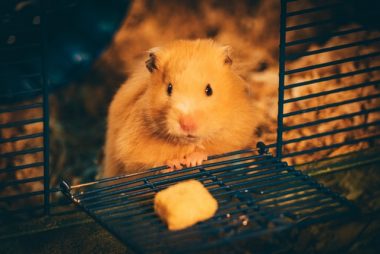Ferrets are fascinating tiny animals. They have the appearance and behaviour of wild weasels (which they are), yet they are also capable of enormous devotion. They also like communicating. These talkative tiny critters produce a variety of sounds, many of which are difficult to understand if you have not heard them before. It is difficult to determine if they are thrilled, upset, or enraged over the outcome of this game.
These loud-mouthed creatures create a lot of noise. In the presence of danger, they employ a loud chatter to signal an alert, and a hiss to convey excitement or anxiety. Males frequently “chortle” to females during breeding, while females whimper to encourage their pups to follow them around.
How do ferrets communicate with other ferrets?
Before knowing how each noise indicates, it is vital to understand why ferrets make them and how they interpret other ferrets’ noises.
To interpret a vocal call, ferrets must “perceive several qualities of complex sounds, including volume, timbre, and pitch.” The observation is according to a paper authored by a group of academics from the University of Oxford.
It implies that ferrets, like humans, consider how a sound is produced instead of just the sound alone. Many of a ferret’s noises are practically identical, save for changes in pitch and length, as mentioned further below.
How does my ferret communicate with me?
Ferrets make a wide range of noises, many of which seem identical, so don’t be alarmed if you are initially perplexed. Even professionals struggle to discern between particular noises from time to time, but with a little practise, you will be conversing like old friends in no time.
When you pay attention to your ferret’s requirements, you should be able to figure out what he’s trying to tell you the majority of the time.
If anything, you may rest assured that these tenacious little creatures will get their message through eventually.
Why is my ferret making weird sounds?
Each vocalization is a vital kind of communication. For example, your ferret may not be feeling well, or a shriek may indicate that he is in serious difficulties or is stuck. Ferrets may be impulsive, so take caution if your little pet is in distress. Keep a diary and keep a record when your ferret makes certain vocalizations so you can figure out what he’s trying to tell you.
What kind of sounds ferrets make?
This talkative little rodent makes a variety of ferret noises that all animal owners should be aware of. The ferrets prefer interacting with their owners. There are a few distinct sounds that this little animal makes to convey his message. Ferrets utilise gestures to communicate as well, though they are usually silent.
Fortunately, we are here to assist you. The following list will explain the many sounds ferrets make. Also, it tells what they signify when they do so. You will never have to look at your little friend with a puzzled expression in responding to another one of their rants again.
- Dooking:
Among the most typical sounds, you will hear from your ferret is dooking. Many people equate it to a chicken’s clucking or chortling, so it is difficult to ignore when your ferret is dooking.
When ferrets are happy or aroused, they emit this good sound. When a new fragrance is introduced, or when they are playing and exploring, you will often hear them dooking.
However, don’t think your ferret is sad simply because they don’t dook. Ferrets’ vocalization differs from one to the next are just calmer and more restrained than some others.
- Barking:
Barking is an uncommon sound made by ferrets, and it has various meanings, as do many other noises. When determining if your ferret’s barking is a positive or bad sound. You will need to pay great attention to their demeanour, body language, and the setting they are in.
Barking is frequently used to indicate enthusiasm, during fun or exploration. If that is the situation, there is no need for you to intervene and separate your ferret. Nevertheless, whether they are barking and displaying symptoms of anxiety, you may need to intervene to ensure that he or she is safe.
- Hisses:
It should come as no surprise that your ferret is irritated when he or she hisses. The ferrets, which were captured in the wild and reared in the laboratory, hissed both when approached and before and during other sounds.
Ferrets will hiss on rare occasions when they are playfully fighting with their cage mates. It is crucial to pay attention to the scenario and other elements like your ferret’s body language. You must check when it is hissing to know when and how to react. Hissing is easily identifiable. It is one of your ferret’s highest-pitched sounds, with a frequency of 2.2 kHz.
- Squeaking:
When your ferret gets aroused, another sound you will hear is squeaking, which, like barking, may not sound like you expect. It sounds more like a giggle than a squeak. Ferrets frequently squeal when they engage with someone else, such as their owner or another ferret. Squeaking is very common during playtime, so it is a positive sign that your tiny friend is having a wonderful time.
However, if you hear your ferret squeak, you should keep an eye on them. The odd squeak is unimportant. But if they become more intense or frequent, you must isolate the ferrets for a few moments to let them calm down.
- Squealing:
Consider how a human infant squeals. Is not it usually because they want to be noticed or because they are delighted and want to play? Ferrets are the same way.
When they start screaming, it typically implies they are enthusiastic and energetic. And they are looking for attention – either from you or from other ferrets, or creatures in the room. You could even hear your ferrets screaming when they are asleep. Ferrets, like humans, dream, and screaming is their equivalent of dreaming while sleeping.
- Screeching:
It might be perplexing: Screeching sounds similar to squeaking (the sort you are used to), but it is not the same. Screeching, as you can assume, is not a pleasant sound to hear. It sounds like a scream and indicates that something is wrong with your pet: they are in pain, in danger, or afraid of anything.
Investigate right away if you hear your ferret shrieking. Then you should get them out of harm’s way, check to any ailments they might well have, and provide them a peaceful spot to relax. The majority of ferrets aren’t aggressive or violent, but if you hear them shrieking, it implies they’ve been pushed to the limit. Don’t take it lightly.

- Sneezing:
Ferrets are often seen close to the ground. What else is on the floor, you ask? It is dust. Debris, to be precise. Grass. Anything that your ferret may ingest unintentionally while playing.
Ferrets have a high sense of smell and are drawn to odors, thus they will sniff almost anything they come across at least several times. It implies that sneezing is not a cause for concern. It is simply a technique for them to cleanse their nose and airways. It happens if they ingest dust while playing or exploring.
If your pet is sneezing often and has other indications of disease, such as a runny nose or discharge from the nose, mouth, or eyes. It is a good idea to take him to the veterinarian.
- Coughing:
Coughing differs from sneezing in that it indicates that your ferret is suffering from an illness. When a ferret has a cold or a respiratory ailment, it may cough. It might also be a sign of allergies.
If you observe your ferret coughing, just what the source, a speedy trip to the veterinarian is the best option.
- Whimpering:
Whimpering is another sound that has a clear significance when compared to similar noises in other animals. Have you ever walked away from your dog for a few moments while having dinner? They may end up whimpering if they are still a puppy.
Your ferret will do the same thing, and it is because they want your attention, much like screaming. They may want to play or be petted, or they may require medical attention. Don’t ignore your ferret if he or she is whining. Before continue with what you were doing, make sure their needs are addressed and show them some love. It will mean a great deal to them.
- Whining:
Whining is comparable to whimpering, but it has a more serious tone to it. Ferrets that whine are typically unwell or in pain, while young ferrets will moan to attract their mothers’ interest.
Whining and whimpering sound nearly identical, with one important distinction: Whining is more frequent and persistent. If you hear the noise, and then it goes away, or if the sound goes away when you pick up your ferret and comfort them. It was most likely simply whimpering.
However, if the sound persists and you are unable to stop it, your ferret is whining and needs medical assistance.
- Snoring:
If you happen to go by your ferret’s enclosure when they are sleeping and hear squeals. You might be astonished to hear them snore! It is perfectly normal and causes no concern. Not all ferrets, like people, snore, but you could find that yours does! So sit back and laugh to yourself as you listen to how sweet it sounds.
- Grinding of Teeth:
Another sound whose severity is determined by the situation in which it is heard is grinding teeth. If you hear grinding during or shortly after meals. it is most likely your ferret is just cleaning their teeth, and there’s no need to be concerned.
However, if you hear it at other times, it implies your tiny companion is in distress. A trip to the veterinarian is almost certainly in order.
When should you visit the veterinarian?
If you hear whimpering or wheezing, take your ferret to a veterinarian who specializes in unusual pets. Your ferret’s vital organs are examined by a doctor. A vet should also feel your tiny pet’s tummy and check for infestations throughout the examination.
- Wheezing might signal that your little pet is having breathing issues, which should be ruled out.
- Whining might indicate that your little friend is unwell, so check sure he has not been hurt while playing.
- Sneezing is entirely natural, but a runny nose should always be avoided.
- Arrange a meeting with your veterinarian if you have a runny nose, eyes, or sneezing.
Each ferret is different, and they, like people, may make a multitude of sounds to indicate their emotions — to see if they’re happy, pleased, or terrified. It is critical for you, as their owner, to be able to recognize these noises and the associated nonverbal cues to determine what their ferret desires.








